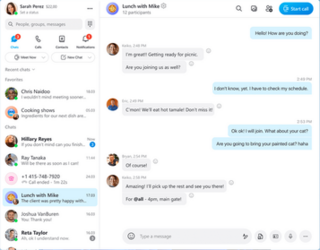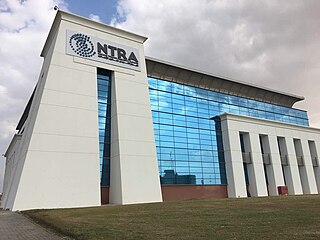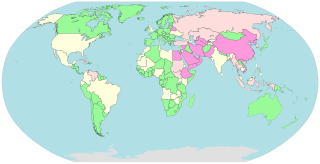
Several countries have interfered with or banned access to the telecommunications application software Skype. [1] [2] The use of the website has also been restricted in other ways. [3]

Several countries have interfered with or banned access to the telecommunications application software Skype. [1] [2] The use of the website has also been restricted in other ways. [3]
After issuance of the new amendment (Article 27.1) to the Personal Data Law on January 14, 2021, Uzbekistan government started demanding foreign agencies to store its citizens' data on Uzbekistan soil. Several companies ignored the request. Thus, Uzbekistan government formally issued a statement saying it blocked several of them including Skype, TikTok, Twitter.
After the complaint from Bangladesh Awami League about using Skype for election interview process by the opposition party of Bangladesh, The Bangladesh Nationalist Party, Bangladesh Telecommunication Regulatory Commission has blocked the telecommunications application Skype.com. [4]
Morocco has boycott Skype as a part of the North African country's telecommunication operators that implemented the ban. [5]
Skype was blocked in Oman for several years as well as others voice calling services. [6] [ better source needed ] In March 2020, Skype was unblocked following the coronavirus pandemic. [7]
Disruption to Skype began in October 2017. The Ministry of Public Security reported that a number of voice over internet protocol apps do not comply with local laws and has since removed Skype from the app store in China, though it is not widely used by domestic consumers. [8]
In the United Arab Emirates, unlicensed VoIP services are blocked. VoIP technology used by various apps such as WhatsApp, Facebook, Viber and Snapchat are inoperative. The Telecommunications Regulatory Authority (TRA) blocked Skype in January 2018, explaining that the service is not licensed. UAE-based telecom operators offer paid VoIP service through their applications BOTIM and C’Me. The block is attributed to the potential loss of revenues that operators such as Du and Etisalat would face as a result of reduced demand for their own telecom services. [9] The blocking of VoIP is a controversial topic in UAE, with many citizens asking for the block of the technology to be removed. [10] However, by using a VPN to access UAE Skype, you will be able to easily gain full access to UAE Skype.
Saudi Arabia censors a wide range of media, including books, newspapers, magazines, films, television, and Internet content. The Saudi government closely monitors and restricts the media in accordance with official state law. Many Internet activities such as websites and VoIP (WhatsApp calling, Skype etc.) are strictly restricted in Saudi Arabia. [11]
Telecommunications in Saudi Arabia have evolved early in the Kingdom since the establishment the Directorate of Post, Telephone and Telegraph (PTT) in 1926.
Telecommunications in the United Arab Emirates (UAE) is under the control and supervision of the Telecommunications and Digital Government Regulatory Authority which was established under UAE Federal Law by Decree No. 3 of 2003. From 1976 to 2006 the Emirates Telecommunications Corporation (Etisalat) was the sole telephone and telecommunications provider for the UAE. And while there were exceptions for free zones and modern housing developments, for the majority of the UAE, Etisalat held a monopoly on business and personal telecommunications services. In February 2006, this monopoly became a duopoly when a new telephone company and Internet service provider (ISP), du, was established to offer mobile services across the UAE and Internet and TV services to some free zone areas. However, due to geographical distribution of service areas, the companies do not compete for customers and thus effectively operate as monopolies. Earlier du provided triple play services to free zone areas under the name Emirates Integrated Telecommunications Company (EITC), which is still its legal name.
The liberalization of Bangladesh's telecommunications sector began with small steps in 1989 with the issuance of a license to a private operator for the provision of inter alia cellular mobile services to compete with Bangladesh Telegraph and Telephone Board (BTTB), the previous monopoly provider of telecommunications services within Bangladesh. Significant changes in the number of fixed and mobile services deployed in Bangladesh occurred in the late 1990s and the number of services in operation has subsequently grown exponentially in the past five years.
Voice over Internet Protocol (VoIP), also called IP telephony, is a method and group of technologies for the delivery of voice communications and multimedia sessions over Internet Protocol (IP) networks, such as the Internet. The terms Internet telephony, broadband telephony, and broadband phone service specifically refer to the provisioning of communications services over the Internet, rather than via the public switched telephone network (PSTN), also known as plain old telephone service (POTS).

Skype is a proprietary telecommunications application operated by Skype Technologies, a division of Microsoft, best known for VoIP-based videotelephony, videoconferencing and voice calls. It also has instant messaging, file transfer, debit-based calls to landline and mobile telephones, and other features. Skype is available on various desktop, mobile, and video game console platforms.
Deep packet inspection (DPI) is a type of data processing that inspects in detail the data being sent over a computer network, and may take actions such as alerting, blocking, re-routing, or logging it accordingly. Deep packet inspection is often used to baseline application behavior, analyze network usage, troubleshoot network performance, ensure that data is in the correct format, check for malicious code, eavesdropping, and internet censorship, among other purposes. There are multiple headers for IP packets; network equipment only needs to use the first of these for normal operation, but use of the second header is normally considered to be shallow packet inspection despite this definition.
E&, doing business as Etisalat by e& is an Emirati-based multinational telecommunications services provider, currently operating in 16 countries across Asia, the Middle East and Africa. It is the 18th largest mobile network operator in the world by number of subscribers. In December 2020, Etisalat claimed to provide the world’s fastest 5G download speed at 9.1 Gigabits per second, a network which it has started rolling out in Dubai since 2017. Etisalat is the strongest brand in the Middle East and Africa, and the 4th strongest telecoms brand in the world.
This is a comparison of voice over IP (VoIP) software used to conduct telephone-like voice conversations across Internet Protocol (IP) based networks. For residential markets, voice over IP phone service is often cheaper than traditional public switched telephone network (PSTN) service and can remove geographic restrictions to telephone numbers, e.g., have a PSTN phone number in a New York area code ring in Tokyo.

Pacific Bangladesh Telecom Limited, operating under the enterprise Citycell, was the oldest mobile operator of Bangladesh. It was 1st mobile operator company in Bangladesh and pioneer telecommunications network companies in South Asia along with Etisalat of Sri Lanka and Paktel of Pakistan. It was the only mobile operator in the country using CDMA and EVDO technology. Citycell's total mobile subscriber base was 0.142 million as of August 2016. The ownership structure of Citycell was divided amongst SingTel (44.54%), Pacific Motors (37.95%) and Far East Telecom (17.51%). It was the smallest mobile operator of Bangladesh in terms of subscribers. In 2016, operations, as a result of the firms inability to pay dues ordered by the BTRC in 2016.
Use of the Internet in Qatar has grown rapidly and is now widespread, but Internet access is also heavily filtered.
In Ethiopia, the Internet penetration rate is 25% as of January 2022, and it is currently attempting a broad expansion of access throughout the country. These efforts have been hampered by the largely rural makeup of the Ethiopian population and the government's refusal to permit any privatization of the telecommunications market. Only 360,000 people had Internet access in 2008, a penetration rate of 0.4%. The state-owned Ethio Telecom is the sole Internet service provider (ISP) in the country. Ethio Telecom comes in at very high prices which makes it difficult for private users to purchase it.

Internet in Afghanistan is available in all of its 34 provinces, and is used by over 9 million people as of 2022. The internet officially became available in 2002 during the presidency of Hamid Karzai. Prior to that year, it was prohibited because the Islamic Emirate of Afghanistan believed that it may be used to broadcast obscene, immoral and anti-Islamic material, and because the few internet users at the time could not be easily monitored as they obtained their telephone lines from neighboring Pakistan.
Like many developed and developing countries, the Internet in Bangladesh has witnessed significant growth. Although facing many constraints in expanding Internet access and use, development of the Internet and Information Technology are high government priorities. In March, 2021 Internet users in Bangladesh increased to 116 million. On 19 February 2018, Bangladesh started the 4G network service.
An over-the-top (OTT) media service is a media service offered directly to viewers via the Internet. OTT bypasses cable, broadcast, and satellite television platforms: the types of companies that have traditionally acted as controllers or distributors of such content. It has also been used to describe no-carrier cellphones, for which all communications are charged as data, avoiding monopolistic competition, or apps for phones that transmit data in this manner, including both those that replace other call methods and those that update software.
Mechanisms for establishing rules ensuring Net neutrality in India, are at present mainly enforced by the Telecom Regulatory Authority of India (TRAI). At present, there are no specific legislation regarding Net Neutrality in India.

The National Telecommunications Regulatory Authority, commonly known as NTRA, is the Egypt government-approved regulatory and competition authority that was established in accordance of the Egyptian telecommunication regulation law No. 10/ 2003 as the national authority equipped to regulate and administer the telecommunications region. Regulating the competition environment between the operators inside the industry according to the Egyptian constitution was a huge mandatory case after the huge rate of telecommunication technology growth, as well as ensuring the availability of qualitative and green telecommunications services.

Link3 Technologies Ltd also known as Link3, is an IT and internet company based in Dhaka, Bangladesh.

This list of Internet censorship and surveillance in Asia provides information on the types and levels of Internet censorship and surveillance that is occurring in countries in Asia.
Shahjahan Mahmood is a Bangladeshi technocrat and chairman of Bangladesh Communication Satellite Company Limited. He is the former Chairman of Bangladesh Telecommunication Regulatory Commission.
Manzurul Alam ndc, psc is a retired major general of the Bangladesh Army and former chairperson of the Bangladesh Telecommunication Regulatory Commission.